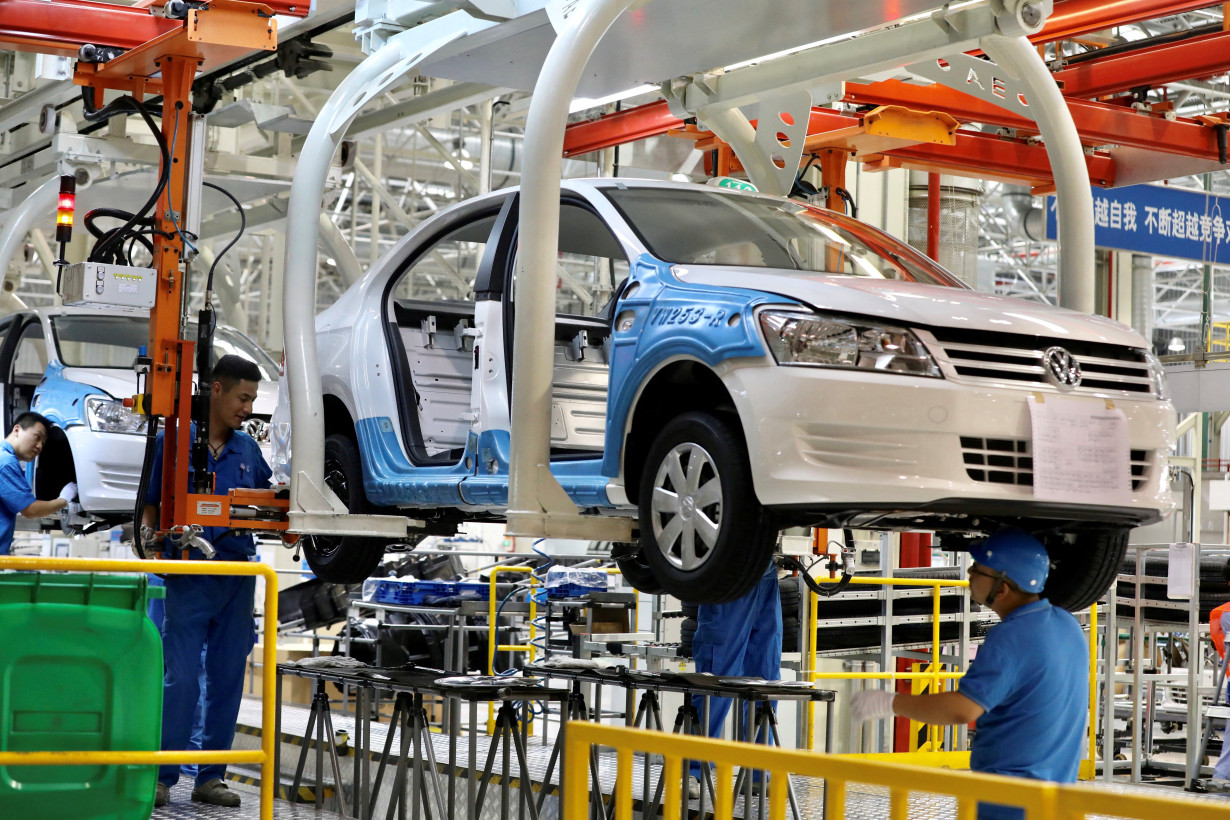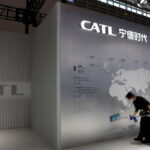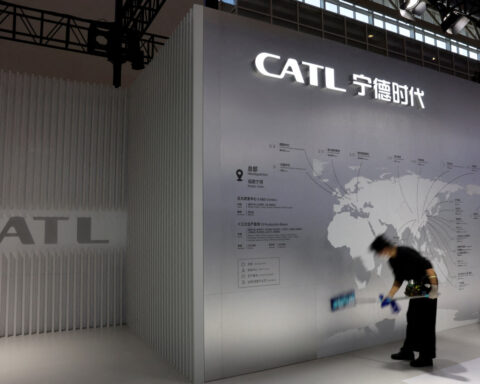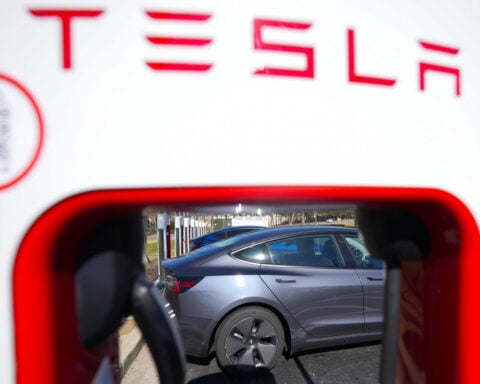SHANGHAI/BERLIN (Reuters) -Volkswagen will sell its operations in China's Xinjiang, it said on Wednesday, after years of mounting pressure to abandon its presence in a region where rights groups have documented abuses against the Uyghur population.

The carmaker made the announcement at the same time as saying it would extend its partnership with Chinese partner SAIC by a decade to 2040, a major move by the German carmaker in its biggest market, where sales have been flagging.
Reuters was the first to report on the deal.
VW and SAIC will sell their plant in Xinjiang to Shanghai Motor Vehicle Inspection Certification (SMVIC), a unit of state-owned Shanghai Lingang Development Group, which will take on all its employees, they said.
Under the terms of the deal, for which financial details were not disclosed, SMVIC will also take over SAIC/VW's test tracks in Turpan, Xinjiang, and Anting in Shanghai. Volkswagen will then no longer have a presence in Xinjiang. Beijing has denied any abuses there.
Stakeholders including the state of Lower Saxony, Volkswagen’s second-largest shareholder, welcomed the sale.
Top 20 shareholder Deka Investment, one of several investors who had been pressuring the carmaker to pull out of Xinjiang, said the exit would bring controversial discussions to an end with minimal financial impact.
The Xinjiang plant, which opened in 2013 and previously assembled Volkswagen's Santana vehicle, had dwindled in significance in recent years after the carmaker cut jobs, leaving about 200 employees to conduct final quality checks and hand over vehicles to dealers in the region.
The facility had the capacity to manufacture 50,000 units annually, but had not produced any cars since 2019.
Volkswagen has denied reports that it kept the plant open as a condition from Beijing to keep producing across China. It said on Wednesday the decision to sell the plant was made for economic reasons.
Volkswagen shares were down 0.5% at 1100 GMT, in line with Germany's blue-chip DAX index. They have lost 26% this year as the company embarks on a major cost-cutting strategy, including job cuts and factory closures in its home market.
REPUTATIONAL RISK
The deal with SAIC comes as trade tensions grow between Beijing and Brussels and Washington.
Late last month, Brussels imposed hefty punitive import tariffs on China-made EVs and U.S. President-elect Donald Trump vowed on Monday to introduce duties of 25% on imports from Mexico and Canada and 10% on Chinese goods.
SAIC incurred the biggest EU tariff rate of 35.3%, on top of the existing 10% import duty.
Deepening ties with SAIC is another example of Beijing rewarding a company and country, Germany, for opposing those duties.
The agreement looks to be mutually beneficial for both joint-venture (JV) partners, removing a major reputational concern for VW and maintaining its access to the world's largest auto market.
It also alleviates a point of tension in the partners' relationship at a time when carmakers are struggling to boost sales in China's sluggish economy.
This was "a long overdue step which showed that human rights are not negotiable," said Janne Werning of VW investor Union Investment.
Chinese carmakers have typically sought tie-ups with Western carmakers because they benefit from gaining access to their deep technical experience.
In turn, VW and others have tapped China's vast EV expertise as they have shifted to electric power away from petrol and diesel engines.
Volkswagen said on Wednesday the JV aims to release 18 new models by 2030, including two extended range models for Chinese consumers in 2026.
Foreign carmakers manufacturing in China were previously required to form a JV with a Chinese carmaker. China began relaxing these rules in 2018, allowing full foreign ownership of passenger car companies since 2022.
Still, the extension of the SAIC tie-up signals that VW intends to keep operating under the JV structure in China, where it also has JVs with state-owned FAW, JAC Automobile Group and more recently with EV-only startup Xpeng.
With Xpeng, VW is developing new models more targeted at Chinese consumers, aiming for over 30 new electric or hybrid models by 2030.
(Reporting by Zhang Yan, Brenda Goh in Shanghai, Victoria Waldersee in Berlin; Editing by Miyoung Kim, Josephine Mason, Kim Coghill, Bernadette Baum, Jan Harvey, Elaine Hardcastle)

 Woman undergoes 'life-changing' procedure years after epilepsy diagnosis
Woman undergoes 'life-changing' procedure years after epilepsy diagnosis
 US FDA proposes standardized testing to detect asbestos in talc products
US FDA proposes standardized testing to detect asbestos in talc products
 'They're children': Witness tries saving two teens in Milwaukee Christmas shooting
'They're children': Witness tries saving two teens in Milwaukee Christmas shooting
 Israel strikes Houthi targets in Yemen, killing three
Israel strikes Houthi targets in Yemen, killing three
 Ukraine's military intelligence says North Korean troops suffer heavy battlefield losses
Ukraine's military intelligence says North Korean troops suffer heavy battlefield losses
 The bird at the center of the worst single-species mortality event in modern history isn’t recovering, scientists say
The bird at the center of the worst single-species mortality event in modern history isn’t recovering, scientists say
 China's CATL to seek Hong Kong listing
China's CATL to seek Hong Kong listing
 Inmates help spread Christmas spirit at Oklahoma correctional centers
Inmates help spread Christmas spirit at Oklahoma correctional centers
 Treasure Coast postal carrier makes Christmas wishes come true
Treasure Coast postal carrier makes Christmas wishes come true
 'They brought happiness and Christmas cheer': Birmingham Bowl players visit VA Hospital on Christmas
'They brought happiness and Christmas cheer': Birmingham Bowl players visit VA Hospital on Christmas







